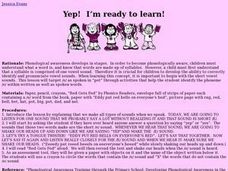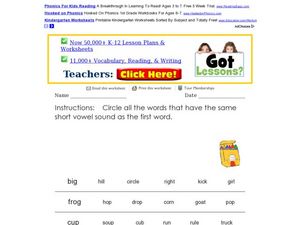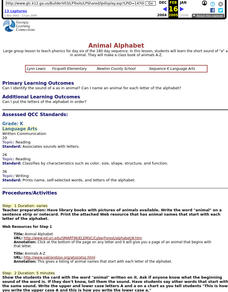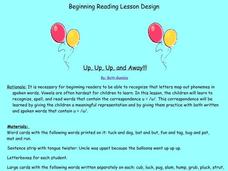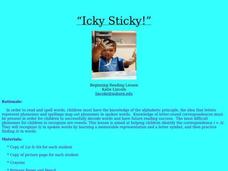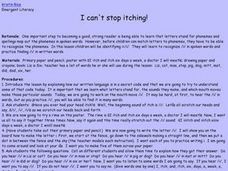Curated OER
Long or Short Vowels?
Vowel letters of the alphabet and the sounds associated with the vowel are the focus of this instructional activity. Students distinguish between both long and short vowel sounds by reading, writing, speaking, and listening to the words...
Curated OER
Medial Sound u
Join Ug the Bug for some vowel sound practice focused on the short /u/ sound. Scholars examine six images and label each with a CVC word that has this as its medial phoneme. Next, they complete two rhyming sentences about Ug, using a...
Curated OER
Scanning Worksheet-Catullus 58
Your advanced Latin learners mark the metrical pattern in Catullus 58, a poem written by Catullus concerning his love and hatred of Lesbia. Spend time translating the poem so your learners have a complete understanding of the passage.
Curated OER
Yep, I'm Ready to Learn!
Tongue twisters give young learners an easy phrase to refer back to when learning letter sounds. Use the phrase "Eddy put red bells on everyone's bed" to identify the /e/ sound. Then read Red Gets Fed aloud, having learners nod their...
Curated OER
The Everyday Red
Pair a hand motion with the /e/ sound so young learners remember it better! This plan has the class open their "creaky door" whenever they hear the /e/ sound. They'll learn a tongue twister and read the short story Red Gets Fed, both of...
Curated OER
Itchy Ritchy
Itchy Ritchy can help your learners remember the /i/ sound! First teach young learners the fun tongue twister illustrating the target sound, and have them identify the target sound in other words. Use the reading Tim and the Top to...
Curated OER
Ehhhh?
Are your kindergarten learners working with the letter e and the sounds that is makes? They'll practice writing a capital e, hear the /e/ sound in a funny tongue twister, and then identify when the teacher is saying a word that uses the...
Curated OER
Short Vowel Sound
Use this creative way to review words that have short vowel sounds. Learners read a word and then identify the words in the group that have the same vowel sound. It is a motivating way to have learners explore this topic.
Curated OER
Spelling Success; Vowel Sounds
There is a big difference between the words bit and bite. Learners begin to understand how to differentiate between short and long vowel sounds as they are given a word with a short vowel sound, and then are asked to add a letter to make...
Curated OER
The Big Pig
Students recognize the short vowel i in written and spoken language. Through matching activities, they discriminate the short vowel /i/ from other vowel sounds. Students associate the phoneme with its letter representation and identify...
Curated OER
Animal Alphabet
Students make a class animal book using the letters of the alphabet. They use a website imbedded in this plan to get pages with animals that begin with any of the 26 letters.
Curated OER
Open Wide and Say Ahh
Pupils recognize the short vowel o in written and spoken language. Through matching and listening activities, they discriminate the vowel sound /o/ from other phonemes. Students identify the phoneme and letter in words and pictures.
Curated OER
Can You Open the Creaky Door?
Students recognize the short vowel e in written and spoken language. Through matching and listening activities, they discriminate the vowel sound /e/ from other phonemes. Students identify the phoneme and letter in words and pictures.
Curated OER
Don't Punch Too Hard
Students recognize the short vowel u in written and spoken language. Through matching and listening activities, they discriminate the vowel sound /u/ from other phonemes. Students identify the phoneme and letter in words and pictures.
Curated OER
Up, Up and Away
Students recognize the short vowel u in written and spoken language. Through matching and listening activities, they discriminate the vowel sound /u/ from other phonemes. Students identify the phoneme and letter in words and pictures.
Curated OER
Icky Sticky
Students recognize the short vowel i in written and spoken language. Through matching and listening activities, they discriminate the vowel sound /i/ from other phonemes. Students identify the phoneme and letter in words and pictures.
Curated OER
It's Icky Sticky
Young scholars recognize the short vowel a in written and spoken language. Through matching and listening activities, they discriminate the vowel sound /a/ from other phonemes. Students identify the phoneme and letter in pseudo words...
Curated OER
Icky Sticky
Students recognize the short vowel i in written and spoken language. Through matching and listening activities, they discriminate the vowel sound /i/ from other phonemes. Students identify the phoneme and letter in pseudo words they read.
Curated OER
Open Up and Say /o/
Students recognize the short vowel o in written and spoken language. Through matching and listening activities, they discriminate the vowel sound /o/ from other phonemes. Students identify the phoneme and letter in words and pictures.
Curated OER
Pooh's Rumbling Tummy
Students recognize the short vowel u in written and spoken language. Through matching and listening activities, they discriminate the vowel sound /u/ from other phonemes. Students identify the phoneme and letter in words and pictures.
Curated OER
Abigail Ant
Pupils recognize the short vowel a in written and spoken language. Through matching and listening activities, they discriminate the vowel sound /a/ from other phonemes. Students identify the phoneme and letter in words and pictures.
Curated OER
The Whining Child
Students recognize the short vowel u in written and spoken language. Through matching and listening activities, they discriminate the vowel sound /u/ from other phonemes. Students identify the phoneme and letter in words and pictures.
Curated OER
I Can't Stop Itching
Students recognize the short vowel i in written and spoken language. Through matching and listening activities, they discriminate the vowel sound /i/ from other phonemes. After reading the story "Liz is Six," students draw a picture with...
Curated OER
Crying Baby Sound
Learners recognize the short vowel a in written and spoken language. Through matching and listening activities, they discriminate the vowel sound /a/ from other phonemes. Students identify the phoneme and letter in words from the story...





